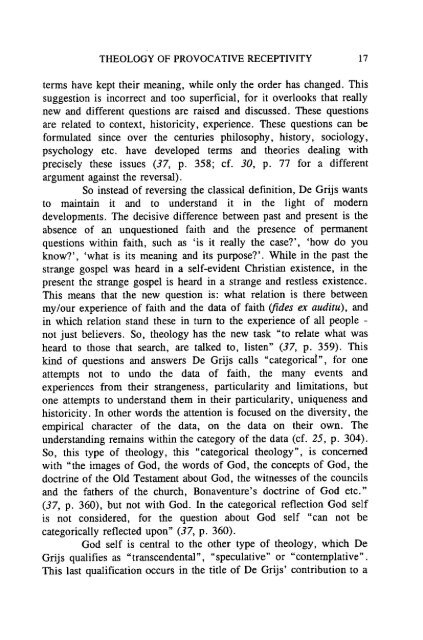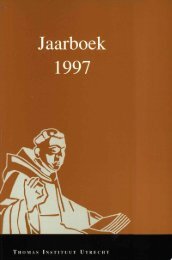Jaarboek Thomas Instituut 1995 - Thomas Instituut te Utrecht
Jaarboek Thomas Instituut 1995 - Thomas Instituut te Utrecht
Jaarboek Thomas Instituut 1995 - Thomas Instituut te Utrecht
You also want an ePaper? Increase the reach of your titles
YUMPU automatically turns print PDFs into web optimized ePapers that Google loves.
THEOLOGY OF PROVOCATIVE RECEPTIVITY 17<br />
<strong>te</strong>rms have kept their meaning, while only the order has changed. This<br />
suggestion is incorrect and too superficial, for it overlooks that really<br />
new and different questions are raised and discussed. These questions<br />
are rela<strong>te</strong>d to con<strong>te</strong>xt, historicity, experience. These questions can be<br />
formula<strong>te</strong>d since over the centuries philosophy, history, sociology,<br />
psychology etc. have developed <strong>te</strong>rms and theories dealing with<br />
precisely these issues (37, p. 358; cf. 30, p. 77 for a different<br />
argument against the reversal).<br />
So ins<strong>te</strong>ad of reversing the classical definition, De Grijs wants<br />
to maintain it and to understand it in the light of modern<br />
developments. The decisive difference between past and present is the<br />
absence of an unquestioned faith and the presence of permanent<br />
questions within faith, such as 'is it really the case?', 'how do you<br />
know?', 'what is its meaning and its purpose?'. While in the past the<br />
strange gospel was heard in a self-evident Christian exis<strong>te</strong>nce, in the<br />
present the strange gospel is heard in a strange and restless exis<strong>te</strong>nce.<br />
This means that the new question is: what relation is there between<br />
my/our experience of faith and the data of faith (fides ex audituï, and<br />
in which relation stand these in turn to the experience of all people -<br />
not just believers. So, theology has the new task "to rela<strong>te</strong> what was<br />
heard to those that search, are talked to, lis<strong>te</strong>n" (37, p. 359). This<br />
kind of questions and answers De Grijs calls "ca<strong>te</strong>gorical", for one<br />
at<strong>te</strong>mpts not to undo the data of faith, the many events and<br />
experiences from their strangeness, particularity and limitations, but<br />
one at<strong>te</strong>mpts to understand them in their particularity, uniqueness and<br />
historicity. In other words the at<strong>te</strong>ntion is focused on the diversity, the<br />
empirical charac<strong>te</strong>r of the data, on the data on their own. The<br />
understanding remains within the ca<strong>te</strong>gory of the data (cf. 25, p. 304).<br />
So, this type of theology, this "ca<strong>te</strong>gorical theology", is concerned<br />
with "the images of God, the words of God, the concepts of God, the<br />
doctrine of the Old Testament about God, the witnesses of the councils<br />
and the fathers of the church, Bonaventure's doctrine of God etc."<br />
(37, p. 360), but not with God. In the ca<strong>te</strong>gorical reflection God self<br />
is not considered, for the question about God self "can not be<br />
ca<strong>te</strong>gorically reflec<strong>te</strong>d upon" (37, p. 360).<br />
God self is central to the other type of theology, which De<br />
Grijs qualifies as "transcendental", "speculative" or "con<strong>te</strong>mplative".<br />
This last qualification occurs in the title of De Grijs' contribution to a








